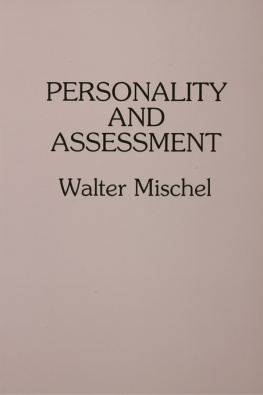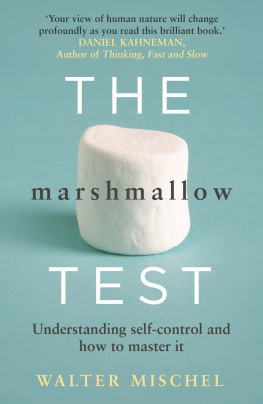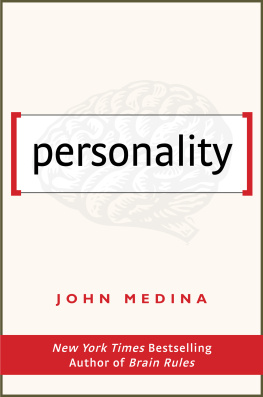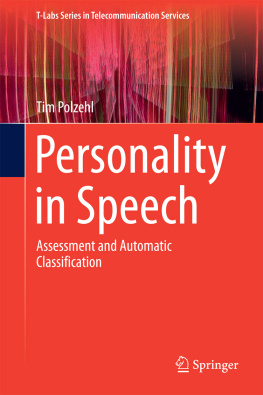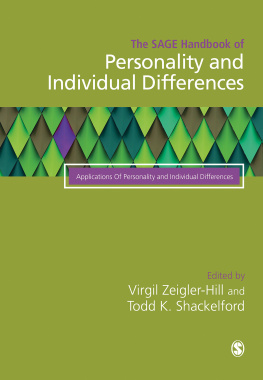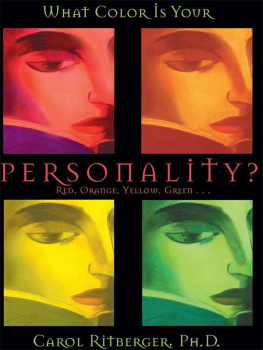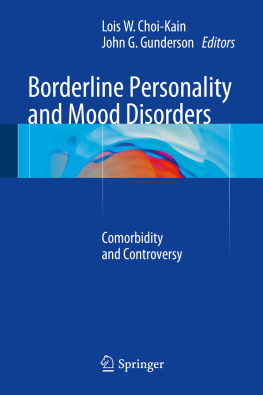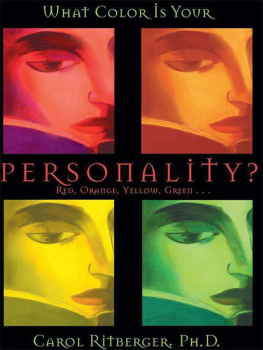
Personality and Assessment
Lawrence Erlbaum Associates, Publishers
Mahwah, New Jersey
PERSONALITY AND ASSESSMENT
WALTER MISCHEL
Professor of Psychology
Stanford University
Lawrence Erlbaum Associates, Publishers
Mahwah, New Jersey
Originally published 1968.
Copyright 1996 by Lawrence Erlbaum Associates, Inc.
All rights reserved. No part of this book may be reproduced in any form, by photostat, microform, retrieval system, or any other means, without the prior written permission of the publisher.
Books published by Lawrence Erlbaum Associates are printed on acid-free paper, and their bindings are chosen for strength and durability.
LC Card Number: 67-31183
ISBN 0-8058-2330-1 (pbk.)
Lawrence Erlbaum Associates, Inc., Publishers
10 Industrial Avenue
Mahwah, New Jersey 07430
Printed in the United States of America
10 9 8 7 6 5
For Harriet, Judith, Rebecca, and Linda
PREFACE
When I started this book I intended to survey six or seven equally viable alternative theoretical approaches to personality and to examine the implications of each for personality assessment, psychotherapy, and research. In the course of this writing, the field has changed substantially and the book and my views along with it. Although a half dozen or more alternative conceptualizations each appeared to be about equally reasonable a decade ago, the list of serious contenders now seems much shorter. This change has occurred mainly because of the voluminous and vigorous empirical researches that have become available in recent years. The resulting evidence makes it possible to start choosing among approaches on the basis of empirical evidence rather than personal preference.
Research findings at this time permit one in the personality area to go much beyond the traditional chronicling of different broad views of man accompanied by the usual illustrations of studies and techniques that seem compatible with each of these perspectives. Instead, it now should be possible to evaluate basic assumptions and personality concepts not only abstractly but also in light of their specific empirical yield. The value of these ideas about personality is tested nowhere more clearly than in their contributions to the prediction and change of important psychological events in the life of the individual. This book therefore is especially attentive to evidence from the areas of personality prediction and personality change. It also should be possible now to extend principles emerging from basic research on personality and social behavior to facilitate personality assessment and therapeutic change. In this effort I am relying heavily on a synthesis of concepts about social learning and cognitive processes and have tried to show its intimate relevance for every step in the measurement and modification of personality. Studies in these latter areas of assessment and change serve, in turn, as the proving grounds for personality constructs and principles; they also have been sparking important modifications in conceptualizations of the nature of personality and of complex disturbed behavior as well as normal behavior.
It has become almost routine to urge a genuine integration of the knowledge of behavior that is emerging from basic experimental research and the findings and issues that face psychologists concerned with the measurement and modification of personality. This book tries to move in that direction. For these purposes it has been necessary to draw on a wide variety and range of studies and ideas and to trespass some of the many boundaries that usually partition the field. In discussing issues of assessment, for example, assumptions about personality that guide particular strategies are examined at least as fully as the measurement techniques themselves; likewise analyses of personality concepts and assumptions are never very far away from research findings; and explications of basic principles soon lead to their applications and specific consequences for assessing and changing personality. In trying to achieve breadth while avoiding confusion, it has also been necessary, of course, to prune and to rely on selected theoretical concepts as guides. Hopefully the biases that such selectivity may introduce are offset by the syntheses toward which this book aims.
Many people have helped me substantially in the development of this book. I am especially deeply indebted to Toni Raskoff who has been a true assistant in every phase of this work during the last year. I am also grateful to all the people who read and reacted to numerous drafts. Among the many who were especially helpful in their detailed comments are Albert Bandura, Donn Byrne, Donald Campbell, Brendan Maher, George Mandler, Joan Meisel, and Julius Wishner. I am also indebted to the students who were my research collaborators in the studies on which sections of this book draw heavily. Those investigations were supported primarily by Research Grant MH 6830 from the National Institute of Mental Health, Public Health Service. In the typing of the manuscript Darlene Lapham showed great care, patience, and secretarial skills which are sincerely appreciated.
Walter Mischel
Stanford, California
January 1968
CONTENTS
Incremental Validity
Summary
Introduction to the Republished Edition
After many out-of-print years, this volume is being reissued in response to an increasing demand for copies. This reflects, I would like to think, that the fundamental questions that motivated Personality and Assessment thirty years ago are still being asked. But more important, the answers-or at least their outlines-now seem to be in sight. In 1968, this book stood as an expression of a paradigm crisis in its critique of the state of personality psychology. The last three decades have been a heady time, first of controversy and debate about the dilemmas raised here, and then of renewal and fresh discoveries. It therefore seems especially timely to revisit the pages which posed the challenges.
In rereading the book, my own surprise is in finding-often in more succinct and clearer form-so much of what I have thought and written in the intervening years. First, the conceptual and empirical limitations of global trait-state constructs and the hazards of equating them with personality itself were described (in the first five chapters) in ways that still seem quite relevant today. This analysis, which proved to be so provocative and upsetting to the field, was widely taken as an attack on personality, rather than what I had intended it to be: a critique of the existing paradigm and a step toward the constructive reconceptualization of personality, as sketched in the remaining chapters.
In this volume, I outlined the need to encompass the situation in the study of personality, but with a focus on the acquired meaning of stimuli and on the situation as perceived, viewing the individual as a cognitive-affective being who construes, interprets, and transforms the stimulus in a dynamic reciprocal interaction with the social world. I focused on the idiographic analysis of personality that had originally motivated the field, and the complexity, discriminative facility, and uniqueness of the individual, and sought to connect the expressions of personality to the individuals behavior, that is, to what people do and not just what they say. Even the intrinsically contextualized ifthen expressions of the personality system-its essential behavioral signatures (Mischel & Shoda, 1995)-were foreshadowed in this book that fired the opening salvo in a search for a truly dynamic personality psychology (last page, last words, this volume). Much of the work my students and I have done in the years since then seems to have been guided by that outline. The reader who would like to see how this work has developed, how it links to the past, and how it looks to the future, should consult Mischel and Shoda (1995).
Next page
